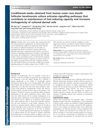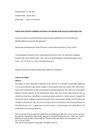TLDR Aging reduces the ability of human hair follicle cells to form new cell colonies.
The study by L'Oreal Advanced Research found that aging negatively impacts the clonogenic potential of human hair follicle keratinocytes. The research involved 28 participants across three age groups: 18-25 years (n=9), 40-45 years (n=10), and 60-70 years (n=9). Results indicated no significant difference in cell growth between the 18-25 and 40-45 age groups, but a marked decrease in the 60-70 age group. There was also a significant reduction in the average number of clones and colony area in participants over 40 compared to those aged 18-25. The proportion of holoclones, which are crucial for growth potential, significantly declined with age, while meroclones slightly increased in those over 40, though not significantly. These outcomes suggest that the regenerative potential of skin and hair diminishes with age due to a decrease in the earliest cell precursors. Statistical analysis using t-tests confirmed the significance of these findings, with a p-value of less than 0.05.
 144 citations
,
September 2012 in “Genes & development”
144 citations
,
September 2012 in “Genes & development” Aging causes skin stem cells to work less effectively.
 6 citations
,
July 2012 in “Experimental Dermatology”
6 citations
,
July 2012 in “Experimental Dermatology” The substance from human hair root cells can help maintain hair growth and make skin cells more capable of growing hair.
11 citations
,
July 2012 in “Experimental dermatology” Innate immunity genes in hair follicle stem cells might have new roles beyond traditional immune functions.
 235 citations
,
January 2011 in “Journal of Clinical Investigation”
235 citations
,
January 2011 in “Journal of Clinical Investigation” Men with baldness due to androgenetic alopecia still have hair stem cells, but lack specific cells needed for hair growth.
 62 citations
,
November 2009 in “Aging Cell”
62 citations
,
November 2009 in “Aging Cell” Hedgehog signaling helps keep hair follicle stem cells the same in both young and old human skin.
 143 citations
,
September 2008 in “Experimental gerontology”
143 citations
,
September 2008 in “Experimental gerontology” Skin aging is due to impaired stem cell mobilization or fewer responsive stem cells.
550 citations
,
December 2005 in “The Journal of clinical investigation/The journal of clinical investigation” Researchers successfully isolated and identified key markers of stem cell-enriched human hair follicle bulge cells.
96 citations
,
December 1995 in “Journal of Investigative Dermatology”
1 citations
,
March 2022 in “IntechOpen eBooks” Aging reduces skin stem cell function, leading to changes like hair loss and slower wound healing.
 15 citations
,
April 2014 in “Experimental Dermatology”
15 citations
,
April 2014 in “Experimental Dermatology” Scientists developed a system to study human hair growth using skin cells, which could help understand hair development and improve skin substitutes for medical use.
 9 citations
,
July 2013 in “Experimental Dermatology”
9 citations
,
July 2013 in “Experimental Dermatology” Aging reduces the ability of human hair follicle cells to form new cell colonies.
28 citations
,
September 2011 in “Stem Cell Reviews and Reports”








